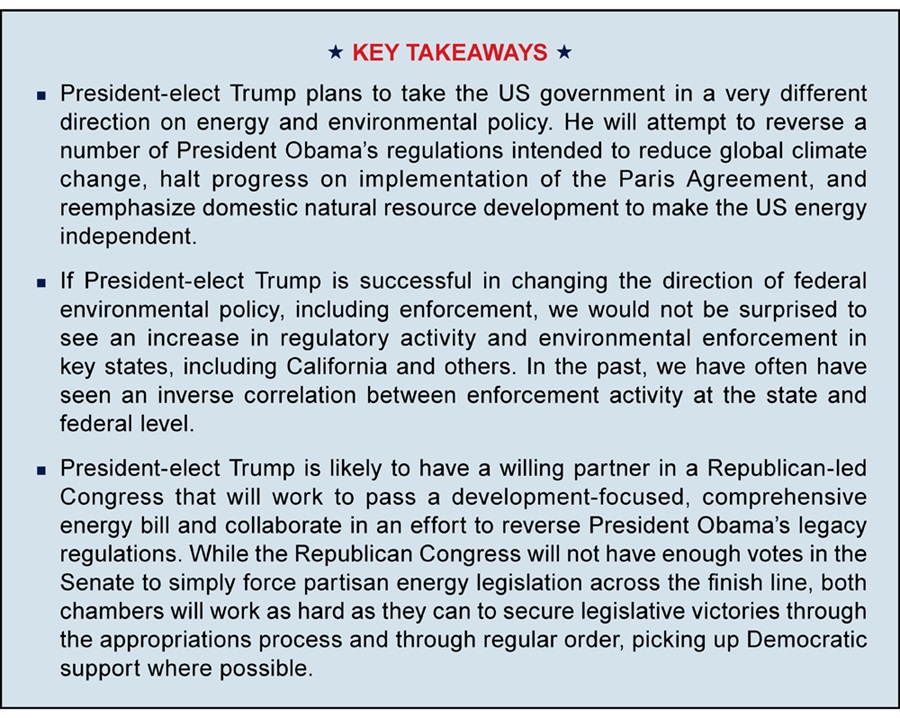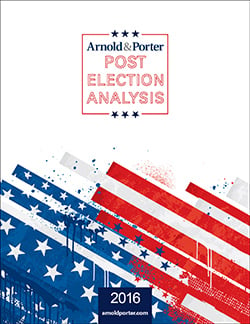Post-Election Analysis 2016: Energy & Environment

Transition Team for Energy Environment
- The Honorable Chris Christie – Governor of New Jersey
- Mike McKenna – Lobbyist
- David Bernhardt – Attorney
- Myron Ebell – Competitive Enterprise Institute, Director of the Center for Energy and Environment
ADMINISTRATION PRIORITIES
President-elect Trump's energy and environment agenda will represent a sharp departure from the Obama Administration, which established and carried out an expansive regulatory agenda designed to combat global climate change. As President, Mr. Trump plans to dramatically stimulate natural resource development in a goal to "unleash American's $50 trillion in untapped shale, oil, and natural gas reserves, plus hundreds of years in clean coal reserves. In doing so, President-elect Trump intends to make the United States completely energy independent (though he may mean that he will make North America energy independent -- the US has a large energy trade with Canada and Mexico). Of course, these goals cannot be achieved while also implementing or enforcing legacy regulatory items initiated by the Obama Administration. As a consequence, President-elect Trump will likely undertake efforts to rescind what he has called "all job-destroying Obama executive actions," including the Clean Power Plan, as well as the US's global climate change commitments under the Paris Agreement.
Implementation of the Paris Agreement. The international community secured a landmark global climate change accord known as the Paris Climate Agreement in December of 2015 at the COP21 conference after more than 190 countries agreed to take steps to: (1) maintain global temperature increases below 2 degrees Celsius above pre-industrial levels; (2) aspire to maintain a more ambitious 1.5 degree increase; and (3) raise $100 billion per year, beginning in 2020, from the public and private sector to help developing nations lower their greenhouse gas (GHG) emissions and adapt to climate change. That Agreement is now in force, as more than 55 parties to the Agreement representing more than 55 percent of global emissions (including the United States and China) formally ratified the Agreement. And while the United States is already taking steps to meet its obligations under the Agreement, including a commitment to reduce its GHG emissions by 26-28 percent below its 2005 level by 2025, a Trump Administration has pledged to halt those activities and completely ignore the US commitments under the Paris Agreement − or withdraw from the agreement entirely.
Clean Power Plan Implementation. The Clean Power Plan represents the Obama Administration's most ambitious regulatory effort to satisfy US commitments under the Paris Agreement. The rule would limit GHG emissions from power plants with a goal of reducing emissions by 30 percent in 2030. After an extensive rulemaking process, the Environmental Protection Agency (EPA) published a final rule in the Federal Register on October 23, 2015. The Clean Power Plan's future, however, remains in doubt as a result of ongoing judicial review in the US Court of Appeals for the District of Columbia after the Supreme Court stayed implementation of the rule on February 9, 2016. The full court in the District of Columbia heard oral arguments on the rule on September 27, 2016. Regardless of the outcome in the Court of Appeals, it seems unlikely that a Supreme Court with a Trump appointee would uphold the rule. Even if the Clean Power Plan survives judicial review, it is likely a Trump Administration will direct the EPA not to implement it and will take steps to rescind the proposal if he can legally do so.
Methane and Volatile Organic Compounds Emission Standards. The incoming Trump Administration opposes the Obama Administration's efforts, which the EPA announced on May 12, 2016, to reduce methane, volatile organic compounds (VOCs), and toxic air emissions from existing sources in the oil and gas industry. The EPA is currently conducting an information collection review (ICR) process through which it is surveying oil and gas operators regarding a range of issues, with a focus on technology that could be used to limit methane emissions and reduce costs. While President-elect Trump may permit the EPA to complete the ICR process, his campaign trail commitments suggest that he will direct the EPA to eliminate the methane and VOC reduction effort as part of the Trump plan to stimulate additional natural gas and oil production.
Natural Resource Development. President-elect Trump's 100-day plan for energy and environmental policy calls for a declaration of "American energy dominance" as a "strategic and foreign policy goal of the United States." That plan calls for the US government to stimulate development of American natural resources in an effort to achieve total energy independence. He would aim to develop as much of the nation's on and offshore natural resources as possible, on public lands and in the private sector, and then use revenue derived from that production to invest in infrastructure, education, and agriculture programs.
Waters of the United States. EPA and the Army Corps of Engineers published a regulation on June 29, 2015 called the "Waters of the United States" rule, expanding the definition of wetlands and other areas that are regulated under the Clean Water Act. During his campaign, President-elect Trump vowed to rescind that rule. He would take steps to do that, and meanwhile would presumably direct EPA and the Corps not to enforce it.
AGENCY LEADERSHIP
President-elect Trump's formal and informal circle of energy and environment policy advisors revolves largely around a small circle of senior level corporate executives, economists, and even a member of Congress with deep experience in natural resource development. A number of these individuals could emerge to serve in senior positions in the White House, the EPA, the Department of Energy, and the Department of Interior, including:
- Rep. Kevin Cramer (R-ND) - US House Member
- Harold Hamm - Chief Executive Officer, Continental Resources
- Stephen Moore - Chief Economist, Heritage Foundation
- Kathleen Hartnett-White - Senior Fellow in residence and Director of the Armstrong Center for Energy & Environment at the Texas Public Policy Foundation
- Forrest Lucas - Co-Founder, Lucas Oil
- Myron Ebell - Competitive Enterprise Institute, Director of the Center for Energy and Environment
CONGRESSIONAL LEADERSHIP
House. There are several top contenders vying for the chair position of the House Energy and Commerce Committee. Rep. John Shimkus (R-IL) who has the most seniority on the committee has been campaigning for the top position for several months. Yet, despite Rep. Shimkus's seniority, Rep. Greg Walden (R-OR) who has led the National Republican Campaign Committee for the last two election cycles, has made it clear he would like the chair position. Both Rep. John Shimkus and Rep. Greg Walden have chaired powerful subcommittees of the committee and are well-known, well-respected members of the House Republican Conference. Rep. Joe Barton (R-TX) also is seeking chair of the committee. Given that he previously served as chair of the full committee from 2004-2007, before becoming the ranking member from 2008-2010, he would need to obtain a waiver from the House Republican Steering Committee to win the gavel. Meanwhile, Rep. Frank Pallone (D-NJ), the committee's current ranking member, is expected to remain the lead Democrat during the 115th Congress.
The House Natural Resources Committee is not expecting to turn over any of its leadership positions, leaving current chair Rep. Rob Bishop (R-UT) as the head of the committee and Rep. Raúl Grijalva (D-AZ) remaining as ranking member. This also is true for the House Ways and Means Committee, where we expect Rep. Kevin Brady (R-TX) to remain chair and Rep. Sander Levin (D-MI) to keep his position as ranking member.
Senate. Sen. Lisa Murkwoski (R-AK) will continue to chair the Senate Energy and Natural Resources Committee with Sen. Maria Cantwell (D-WA) remaining as the committee's ranking member. Sen. John Barrasso (R-WY) is expected to chair the Senate Environment and Public Works (EPW) Committee. The Senate EPW ranking member is also expected to change, following the retirement of Sen. Barbara Boxer (D-CA), to Sen. Thomas Carper (D-DE) as he is next in line to serve based on his seniority. The Senate Finance Committee will remain the same with Sen. Orrin Hatch (R-UT) as the chair and Sen. Ron Wyden (D-OR) as the ranking member of the committee.
CONGRESSIONAL PRIORITIES
While the 114th Congress was an especially busy time for energy policy, we are likely to see even more movement in the 115th. With Republicans retaining control of both the House and Senate, and controlling the White House, we are likely to see a flurry of activity around energy efficiency, repealing or reforming large energy agreements made by the Obama Administration, and an increased focus on moving forward with a comprehensive energy legislation and updating outdated energy policies.
Comprehensive Energy Legislation. If Congress fails to pass a comprehensive energy bill in the lame-duck session this year, passing a comprehensive energy bill with an emphasis on natural resource development, regulatory reform, and other conservative priorities will continue to be a top priority of House Energy and Commerce leaders and Sen. Lisa Murkowski in the 115th Congress.
With the Trump Administration, House Energy and Commerce Committee, and Senate Energy and Natural Resources leadership under Republican control, it is likely many of the issues that have held up energy and environmental legislation will move. Republicans will begin to rewrite pieces of the legislation related to strengthening protections for the coal, oil, and gas industries, reducing current regulatory burdens, and cutting new programs included in previously passed legislation. Additionally, Republicans are likely to limit the government's overall involvement in the energy sector and reduce the amount of spending on new loan programs or subsidies and instead focus on investing federal dollars in new innovative technologies and grid modernization efforts.
International Energy and Environment Agreements. Halting the Obama Administration's Clean Power Plan and implementation of the Paris Agreement are likely to remain top priorities for a Republican-led Congress and Trump Administration. While Republican leadership on the House Energy and Commerce Committee will change, it is unlikely the committee will dial back its efforts to stop the Clean Power Plan. It is more likely than ever to continue to draft legislation, hold hearings, and engage stakeholders to apply further pressure on the EPA. Further, many Senate Republicans, such as Sen. Mitch McConnell (R-KY), have been outspoken on the Paris Agreement, and how the Obama Administration did little to engage with Congress to receive its approval before moving forward with such a significant international agreement. Due to the lack of consultation with Congress, and in particular Republican leaders, it is likely Republicans will work hard to roll back the Obama Administration's climate-change measures during the 115th Congress.
Energy Policy and Conservation Act Reforms. Earlier this year the House Energy and Commerce Committee held a hearing to kick off a potential process to reform provisions of the Energy Policy and Conservation Act (EPCA) that address mandatory energy conservation standards and the Department of Energy's implementation of the statute. During the hearing, House Republicans made clear they are unhappy with both the existing law and Department's application of the statute, and believe that the Department's regulatory activities are driving up costs without producing commensurate energy savings for consumers. We anticipate that Republican leaders on both sides of the aisle will continue to develop the EPCA reform process in 2017 under unilateral Republican control of the federal government, even if the Office of Energy Efficiency & Renewable Energy's agenda for appliance standard review and amendment slows or stops altogether under President-elect Trump.
Our full analysis of the 2016 election is available below.

